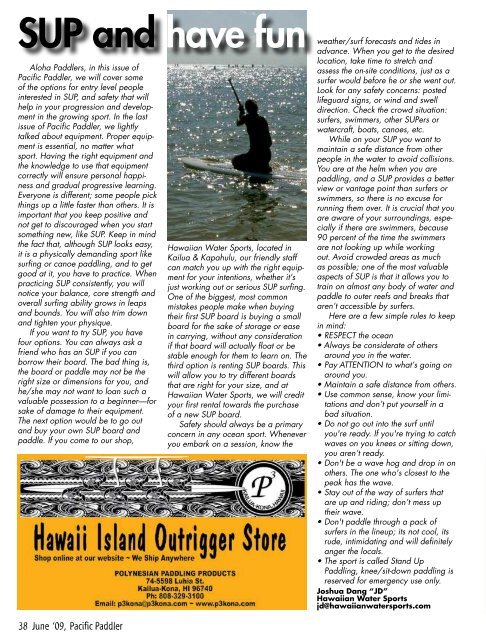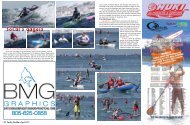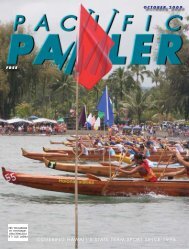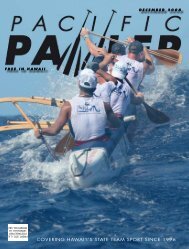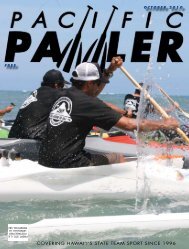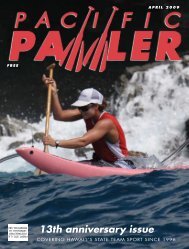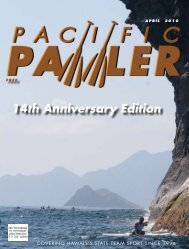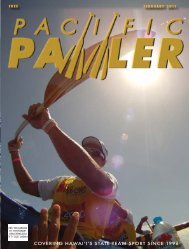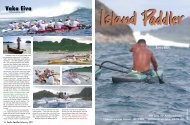You also want an ePaper? Increase the reach of your titles
YUMPU automatically turns print PDFs into web optimized ePapers that Google loves.
SUP and have fun<br />
Aloha <strong>Paddler</strong>s, in this issue of<br />
<strong>Pacific</strong> <strong>Paddler</strong>, we will cover some<br />
of the options for entry level people<br />
interested in SUP, and safety that will<br />
help in your progression and development<br />
in the growing sport. In the last<br />
issue of <strong>Pacific</strong> <strong>Paddler</strong>, we lightly<br />
talked about equipment. Proper equipment<br />
is essential, no matter what<br />
sport. Having the right equipment and<br />
the knowledge to use that equipment<br />
correctly will ensure personal happiness<br />
and gradual progressive learning.<br />
Everyone is different; some people pick<br />
things up a little faster than others. It is<br />
important that you keep positive and<br />
not get to discouraged when you start<br />
something new, like SUP. Keep in mind<br />
the fact that, although SUP looks easy,<br />
it is a physically demanding sport like<br />
surfing or canoe paddling, and to get<br />
good at it, you have to practice. When<br />
practicing SUP consistently, you will<br />
notice your balance, core strength and<br />
overall surfing ability grows in leaps<br />
and bounds. You will also trim down<br />
and tighten your physique.<br />
If you want to try SUP, you have<br />
four options. You can always ask a<br />
friend who has an SUP if you can<br />
borrow their board. The bad thing is,<br />
the board or paddle may not be the<br />
right size or dimensions for you, and<br />
he/she may not want to loan such a<br />
valuable possession to a beginner—for<br />
sake of damage to their equipment.<br />
The next option would be to go out<br />
and buy your own SUP board and<br />
paddle. If you come to our shop,<br />
Hawaiian Water Sports, located in<br />
Kailua & Kapahulu, our friendly staff<br />
can match you up with the right equipment<br />
for your intentions, whether it’s<br />
just working out or serious SUP surfing.<br />
One of the biggest, most common<br />
mistakes people make when buying<br />
their first SUP board is buying a small<br />
board for the sake of storage or ease<br />
in carrying, without any consideration<br />
if that board will actually float or be<br />
stable enough for them to learn on. The<br />
third option is renting SUP boards. This<br />
will allow you to try different boards<br />
that are right for your size, and at<br />
Hawaiian Water Sports, we will credit<br />
your first rental towards the purchase<br />
of a new SUP board.<br />
Safety should always be a primary<br />
concern in any ocean sport. Whenever<br />
you embark on a session, know the<br />
weather/surf forecasts and tides in<br />
advance. When you get to the desired<br />
location, take time to stretch and<br />
assess the on-site conditions, just as a<br />
surfer would before he or she went out.<br />
Look for any safety concerns: posted<br />
lifeguard signs, or wind and swell<br />
direction. Check the crowd situation:<br />
surfers, swimmers, other SUPers or<br />
watercraft, boats, canoes, etc.<br />
While on your SUP you want to<br />
maintain a safe distance from other<br />
people in the water to avoid collisions.<br />
You are at the helm when you are<br />
paddling, and a SUP provides a better<br />
view or vantage point than surfers or<br />
swimmers, so there is no excuse for<br />
running them over. It is crucial that you<br />
are aware of your surroundings, especially<br />
if there are swimmers, because<br />
90 percent of the time the swimmers<br />
are not looking up while working<br />
out. Avoid crowded areas as much<br />
as possible; one of the most valuable<br />
aspects of SUP is that it allows you to<br />
train on almost any body of water and<br />
paddle to outer reefs and breaks that<br />
aren’t accessible by surfers.<br />
Here are a few simple rules to keep<br />
in mind:<br />
• RESPECT the ocean<br />
• Always be considerate of others<br />
around you in the water.<br />
• Pay ATTENTION to what’s going on<br />
around you.<br />
• Maintain a safe distance from others.<br />
• Use common sense, know your limitations<br />
and don’t put yourself in a<br />
bad situation.<br />
• Do not go out into the surf until<br />
you're ready. If you're trying to catch<br />
waves on you knees or sitting down,<br />
you aren’t ready.<br />
• Don't be a wave hog and drop in on<br />
others. The one who's closest to the<br />
peak has the wave.<br />
• Stay out of the way of surfers that<br />
are up and riding; don’t mess up<br />
their wave.<br />
• Don't paddle through a pack of<br />
surfers in the lineup; its not cool, its<br />
rude, intimidating and will definitely<br />
anger the locals.<br />
• The sport is called Stand Up<br />
Paddling, knee/sit-down paddling is<br />
reserved for emergency use only.<br />
Joshua Dang “JD”<br />
Hawaiian Water Sports<br />
jd@hawaiianwatersports.com<br />
Paddling in the Northwest<br />
You have to really like this sport<br />
to brave the weather we have here in<br />
Oregon and Washington. The first<br />
race of the season for PNW/ORCA<br />
is called the Rusty Iron and is held on<br />
the Willamette River in Portland. This<br />
is a race famous for bad weather.<br />
Held early in the spring, we have seen<br />
sleet, hail, rain, thunder, lightening<br />
and absolutely beautiful sun that is<br />
often the source of my first sunburn of<br />
the season. And that can all be in one<br />
day, folks, no joke.<br />
Despite this, it is also one of the<br />
best attended races of the season.<br />
After a long winter, it is fun and<br />
exciting to get back on the water and<br />
see old friends. Some teams drive for<br />
three hours to attend and have only a<br />
few practices under their belt before<br />
the 10 mile race.<br />
The Rusty Iron Race is a loop on a<br />
river with a pretty mean current in the<br />
spring which can stir up all sorts of<br />
interesting flotsam. We play chicken<br />
Passing under St John's Bridge<br />
The mission of the Coast Guard<br />
Recreational Boating Safety Program<br />
is to minimize the loss of life, personal<br />
injury, property damage and environmental<br />
impact associated with the use<br />
of recreational boats, through preventive<br />
means.<br />
Boat owners who are interested in<br />
finding out how well their boats comply<br />
with Federal and State recreational<br />
boating safety and environmental laws<br />
can take advantage of the United States<br />
Coast Guard Auxiliary Vessel Safety<br />
Trailoring across Mt. Hood<br />
Five ladies and a want-to-be<br />
with fisherman on opening day, dodge<br />
floating logs and lawn chairs, and if<br />
we're lucky, we can surf the rollers<br />
coming off a passing barge.<br />
All in all it makes for a fun, if a bit<br />
chilly, start to the 6-man season. Some<br />
of us may not race again until <strong>June</strong>,<br />
and getting in that one race early in<br />
the year helps inspire us to attend<br />
practices no matter the weather.<br />
It's probably hard to imagine, for a<br />
Check (VSC) Program to have their<br />
boats inspected by qualified Auxiliary<br />
vessel examiners. This process raises<br />
the boaters’ awareness of safety and<br />
other boating issues, through a oneon-one<br />
discussion with the volunteer<br />
vessel examiners during the Vessel<br />
Safety Check. Not only will a successful<br />
safety check result in greater safety and<br />
awareness, it provides boat owners with<br />
a Vessel Safety Check Decal of passing<br />
that will be placed on the boat to show<br />
current compliance with all safety<br />
Hawaiian or Californian, the appeal<br />
of outrigger paddling without the sun<br />
and the ocean. It's different, there is<br />
no doubt, but the spirit of the sport is<br />
still strong. On a day when the river<br />
is flat and the weather is grey, we still<br />
feel a part of the whole. The long arm<br />
of Aloha reaches beyond the shores of<br />
Hawaii to inspire even the smallest of<br />
paddling communities.<br />
Amy Graves,<br />
Bend Oregon Outrigger<br />
The importance of the Vessel Safety Check Program<br />
requirements and regulations. Boaters<br />
who display the Vessel Safety Check<br />
Decal can also take advantage of safeboater<br />
discounts available from most<br />
marine insurance companies, which can<br />
amount to a 10-15 percent savings on<br />
insurance.<br />
Often, special boating safety vessel<br />
inspection days are scheduled at<br />
specific marinas and boat launch locations<br />
where a number vessel examiners<br />
can complete safety checks on a large<br />
number of boats in a single day.<br />
38 <strong>June</strong> ‘09, <strong>Pacific</strong> <strong>Paddler</strong> pacificpaddler.com <strong>June</strong> ‘09 39


